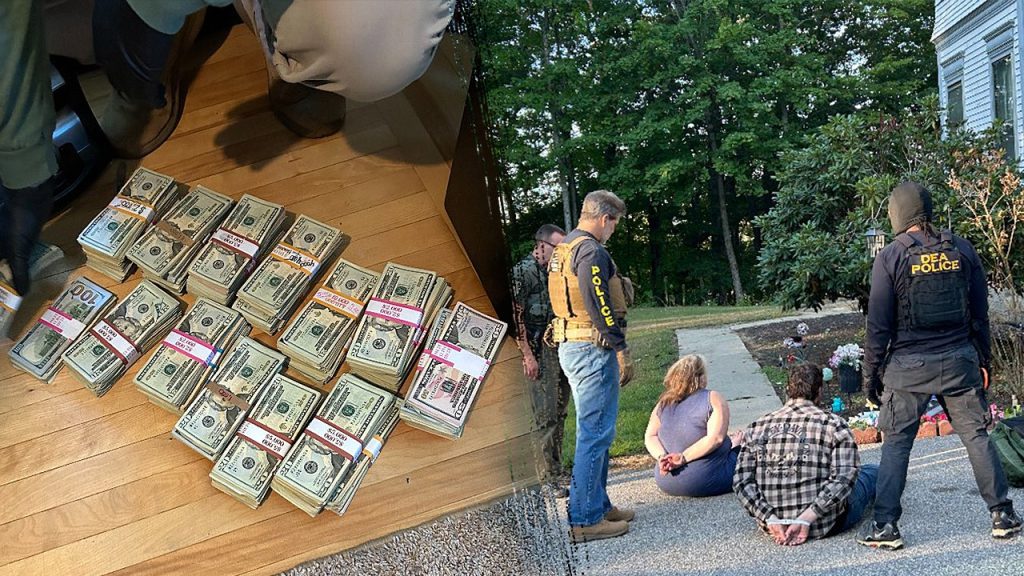DEA Arrests 27 in New Hampshire Drug Bust Linked to Mexico’s Sinaloa Cartel
In a significant blow to drug trafficking operations in New England, the Drug Enforcement Administration (DEA) announced Wednesday the arrest of 27 individuals in Franklin, New Hampshire. This major narcotics bust targeted a distribution network responsible for supplying fentanyl and methamphetamine throughout the region. According to federal investigators, the operation revealed a clear supply chain running through Lawrence, Massachusetts—a city long recognized as a distribution hub for synthetic drugs in the Northeast—with direct connections to Mexico’s notorious Sinaloa cartel. The arrests represent a critical step in combating the devastating impact of these substances on local communities, though authorities acknowledge that the investigation remains active with potentially more arrests to come.
The DEA’s New England office proudly shared news of the operation on social media, posting: “Twenty seven people in Franklin, New Hampshire have just been arrested! Fentanyl and methamphetamine sourced from Lawrence, Massachusetts have been seized. The drugs are directly linked to the Sinaloa Cartel. The investigation continues.” This announcement was accompanied by images showing suspects in handcuffs outside a residence, along with bundles of seized cash—tangible evidence of the operation’s initial success. For residents of Franklin, a small New Hampshire community now thrust into the spotlight of this international drug trafficking story, the scale of the operation reveals the surprising reach of cartel influence into even the most unexpected corners of America.
What makes this bust particularly significant is its connection to the Sinaloa cartel, one of Mexico’s most powerful and violent criminal organizations. Federal officials have consistently identified this cartel as a dominant force in the fentanyl trade targeting the United States. The synthetic opioid has created a public health crisis of staggering proportions across America, with the Centers for Disease Control and Prevention reporting more than 70,000 fentanyl-related overdose deaths annually. The potency of fentanyl—up to 50 times stronger than heroin—makes it particularly lethal, and its increasing presence in drug supplies has devastated communities large and small. This operation demonstrates how international criminal enterprises have created sophisticated distribution networks that can reach deep into rural American towns like Franklin.
The role of Lawrence, Massachusetts as a key distribution point highlights the regional nature of drug trafficking networks. Located about 90 miles from Franklin, Lawrence has repeatedly been identified by law enforcement as a critical node in New England’s drug distribution infrastructure. Drug shipments often arrive in larger metropolitan areas before being broken down and transported to smaller communities, creating a web of criminal activity that spans across state lines. This operation appears to have successfully targeted multiple levels of this distribution chain, from street-level dealers to those with direct connections to international suppliers. For families affected by addiction in these communities, the bust represents hope that the supply of these deadly substances might be temporarily disrupted.
Behind the headlines and arrest numbers lies the human toll of the fentanyl crisis. Each seized packet represents countless potential overdoses averted, families spared the grief of loss, and communities given breathing room from the relentless pressure of addiction and drug-related crime. The 27 individuals arrested are now facing the criminal justice system, while investigators continue to build cases against others involved in the network. Many of those caught in such operations occupy various roles in the distribution chain—from major players with direct cartel connections to those whose own addiction has led them to dealing to support their habit. The complexity of these networks reflects the equally complex challenge of addressing both the supply and demand sides of America’s ongoing struggle with synthetic opioids.
While this operation marks a significant achievement in law enforcement efforts, experts recognize that supply-side interventions alone cannot solve the broader crisis. The DEA’s work continues, with officials indicating that more arrests may follow as they unravel additional connections in this trafficking network. Meanwhile, health officials, addiction specialists, and community leaders continue to advocate for comprehensive approaches that include treatment, prevention, and harm reduction strategies alongside enforcement actions. Recent legislative efforts, including new laws targeting fentanyl trafficking, aim to provide additional tools for prosecutors and law enforcement. For now, however, this Franklin, New Hampshire bust serves as a reminder of both the pervasive nature of the fentanyl threat and law enforcement’s ongoing determination to disrupt the criminal organizations profiting from America’s deadliest addiction crisis.


